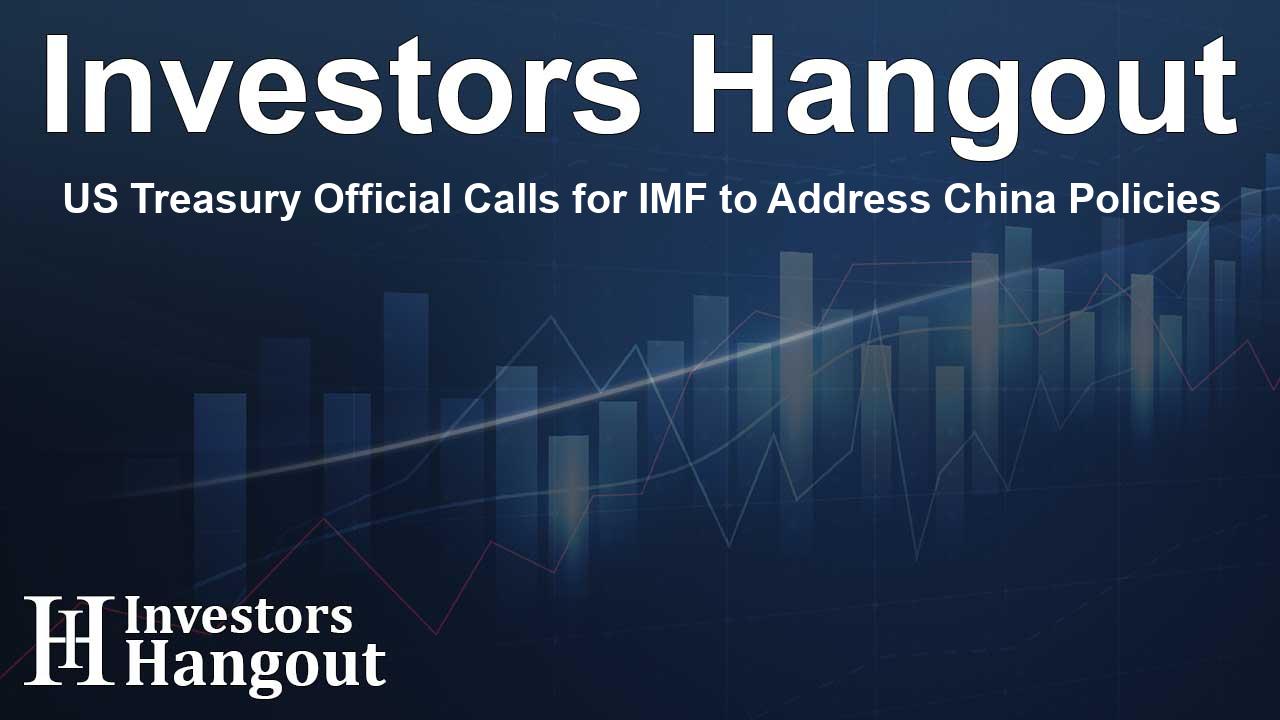US Treasury Official Calls for IMF to Address China Policies

US Treasury Highlights IMF's Concerns Regarding China
A senior official from the U.S. Treasury has made headlines by stating that the International Monetary Fund (IMF) should adopt a more direct approach when addressing China's economic policies. This assertion reflects a growing concern regarding the influence of China's financial practices on global markets.
IMF's Approach Under Scrutiny
Brent Neiman, who serves as the Treasury's deputy undersecretary for international finance, suggested that the IMF has been 'too polite' in its criticisms. Neiman emphasized that there is a lack of analytical depth in the IMF's evaluations of China's industrial policies. This criticism comes as the IMF prepares for its annual meetings where various global financial issues will be discussed.
The Importance of Transparency
During a recent event hosted by a financial think tank, Neiman expressed concerns about how the IMF manages its relationships with countries like China. He stressed the importance of transparency, especially regarding external financial assurances that China provides to support IMF loans. These assurances are crucial for maintaining confidence in international financial systems, particularly for nations like Argentina, Ecuador, and Suriname, who have benefited from such agreements.
Facing the Challenges of China's Industrial Policies
Neiman pointed out that the IMF's annual economic assessments of China often overlook significant factors such as exchange rates and industrial policies. He stated that the role of state-owned banks in manipulating the exchange rates has not been adequately addressed. This oversight could potentially influence global economic stability, as China's economic strategies have far-reaching implications.
The Impact of Recent Financial Developments
Recently, the IMF approved a $7 billion program for Pakistan, which included financial assurances from several countries, including China. However, the details of these assurances were not disclosed. Neiman criticized this lack of information, arguing that by referring to China merely as Ecuador's 'main bilateral creditor,' the IMF inadvertently encourages a culture of leniency among creditors regarding their commitments.
The Need for a 'Ruthless Truth Teller'
Neiman described the IMF's role as that of a 'ruthless truth teller.' He believes that for the IMF to maintain its credibility and effectiveness, it must confront these issues head-on. By ignoring critical aspects of China’s economy, the IMF risks losing the trust of member countries, especially those who are directly affected by China's policies.
Global Economic Outlook
As the IMF and World Bank gear up for their meetings, the tension surrounding China's economic influence continues to grow. The need for more robust dialogue and analysis is paramount as nations navigate these complex financial landscapes. The upcoming discussions are expected to focus on not just China’s role but the overall implications of large economies on international financial systems.
Frequently Asked Questions
What did the U.S. Treasury official say about the IMF's criticisms of China?
The U.S. Treasury official criticized the IMF for being too polite in its evaluations and lacking transparency regarding China's impact on global finance.
Why is transparency important in international finance?
Transparency helps maintain trust among nations, ensuring that all parties adhere to their financial commitments, which is essential for global economic stability.
What specific issues did the official highlight about China's economic policies?
He emphasized overlooked areas such as exchange rates managed by state-owned banks and the reliance on external financial assurances from countries like China.
How does the IMF's attitude affect creditor relationships?
By being overly cautious in its language about China, the IMF may inadvertently reduce incentives for creditors to honor their commitments promptly.
What is expected at the upcoming IMF meetings?
The meetings will focus on various global economic issues, including discussions on policies that address China's influence on international financial systems.
About Investors Hangout
Investors Hangout is a leading online stock forum for financial discussion and learning, offering a wide range of free tools and resources. It draws in traders of all levels, who exchange market knowledge, investigate trading tactics, and keep an eye on industry developments in real time. Featuring financial articles, stock message boards, quotes, charts, company profiles, and live news updates. Through cooperative learning and a wealth of informational resources, it helps users from novices creating their first portfolios to experts honing their techniques. Join Investors Hangout today: https://investorshangout.com/
Disclaimer: The content of this article is solely for general informational purposes only; it does not represent legal, financial, or investment advice. Investors Hangout does not offer financial advice; the author is not a licensed financial advisor. Consult a qualified advisor before making any financial or investment decisions based on this article. The author's interpretation of publicly available data shapes the opinions presented here; as a result, they should not be taken as advice to purchase, sell, or hold any securities mentioned or any other investments. The author does not guarantee the accuracy, completeness, or timeliness of any material, providing it "as is." Information and market conditions may change; past performance is not indicative of future outcomes. If any of the material offered here is inaccurate, please contact us for corrections.